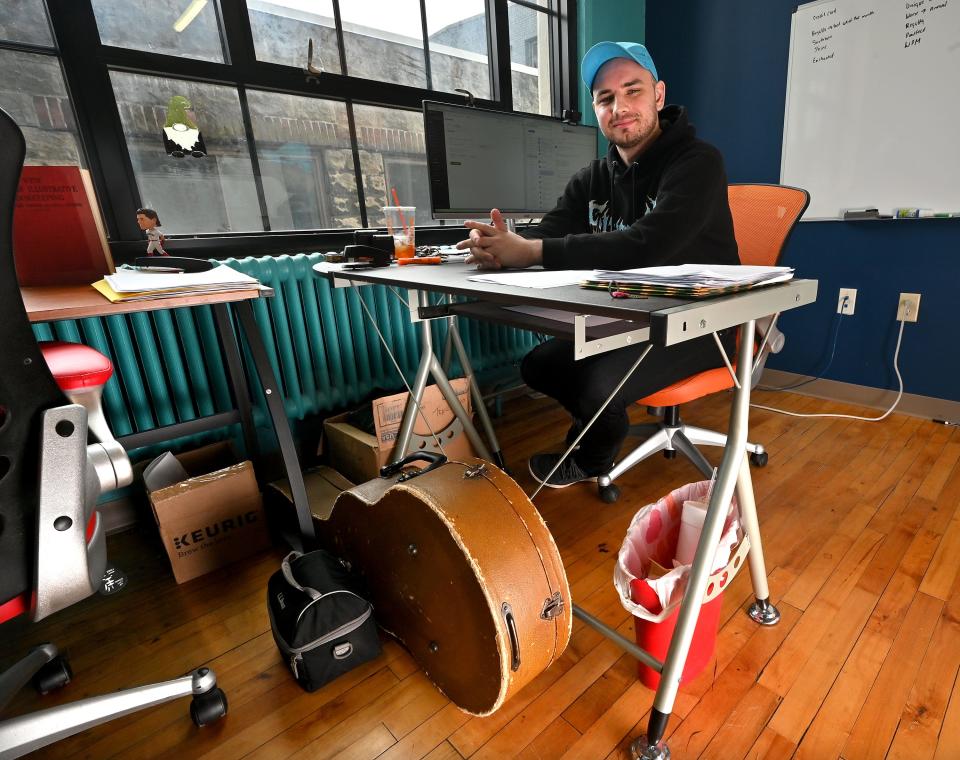Mass. lawmakers champion funding for worker-owned businesses
After working with Ben Cohen of Ben & Jerry’s fame on the creation of a cooperative clothing manufacturer, SweatX, in Los Angeles, Kevin O’Brien brought the experience back to his hometown of Worcester where he launched WorX Printing Cooperative, an employee-owned business.

The company, with eight full-time employees and a partnership with the Worcester Technical High School graphics department, prints merchandise in bulk and piece-by-piece for socially conscious and progressive clients including state Sens. Elizabeth Warren and Ed Markey.
“It’s nice to know I am part of positive change in the world,” said O’Brien, the company’s founder, general manager and one of its owner-workers. The printing enterprise is a worker-owned union cooperative, and the company’s products can be seen all around Worcester - on the backs of teachers at City Hall rallies, at the recent Earth Day cleanup and at the United Way Day of Caring.
“Once I discovered it (worker-owned cooperative business model) was out there, it’s hard to go back, I didn’t want to go back, to the traditional way of organizing a business,” O’Brien said.
Worker-owned cooperatives growing in Mass.
It’s an idea that is taking hold in Massachusetts and around the United States. Massachusetts ranks third in the United States in the number of employee-owned businesses. And while the sector isn’t huge, it is growing.
Massachusetts lawmakers embraced the concept in 2022 in the Economic Development Bill enacted in the fall by pulling the standalone agency Massachusetts Center for Employee Ownership into state government.
And this year, legislators like Sen. Adam Gomez, D-Springfield, are seeking to create a funding pool of $1.7 million in the office for grants and loans for ventures to draw down on. Rep. Orlando Ramos, D-Springfield, is championing an amendment to the House budget that would add some $5 million to the office of Small Business Technical Assistance.
“We are looking to ensure that the office has funding to give out,” said Alex Papali, director of regional economies at the Center for Democratic Economy. “Cooperatives don’t have access to traditional sources of working capital.”

Both the federal Small Business Administration and banks are leery of cooperative joint ventures. The federal agency also has structural barriers that inhibit loans and grants to cooperative enterprises.
“It’s a structure of business ownership that is not familiar to the federal government,” Papali said. Conventional lenders are reluctant to fund them, and technical assistance providers have traditionally left out worker coops.
However, many communities around the world have embraced the concept of cooperative business.
Steel workers in Spain’s Basque country founded Mondragon as a worker-owned, steel production venture. It has since grown to 95 self-governing cooperatives employing 80,000 people with 14 research and development centers. It ranks as the No. 1 business in the Basque country and 10th in Spain. The cooperative operates 141 production plants in 37 countries, commercial business in 53, and sales in more than 150.
Democracy is more than just voting
Democracy, according to the Center for Economic Democracy, is not just an electoral concept, not just about voting.
“People have decided they need democracy in their day-to-day work lives,” said Helen “Homefries” Matthews, a spokesperson for the center.
Supporters of the idea emphasize that democratic participation and dignified jobs are core to the worker-owned business model, fostering higher productivity, resilience during economic downturns, higher household incomes, greater retirement savings and better business performance.
It could be the future of work.
A snap-shot report commissioned by the Coalition for Worker Ownership and Power compiled by UMass Amherst in 2022 indicates there were some 65 worker-owned cooperatives in the state, concentrated in the western and central urban areas, Boston and the Cape. And growing.
“We’re at a crossroads,” Matthews believes.
Embracing worker-owned business is part of the movement away from corporate domination and toward workers having more agency in their labor. The Great Resignation, the movement to organize and form unions, the coming mass retirement of the baby boomer generation and the silver tsunami are all components of the growing social movement toward a more humane workplace and a more humane way to organize society.
Some 85% of employee-owned businesses are founded by people of color, according to Papali, who added that fully 61% are women-owned. He believes that supporting worker-owned businesses can be a factor in racial and economic justice strategies.
“We know a large number of workers are laving traditional jobs, dissatisfied with the traditional employment structures,” Papali said. “They want more agency, more of a say in their workplaces, more dignity. This is a way to democratization of work places to meet employee needs.”
Bookkeeping is also cooperative for Worcester business
At Worcester Bookkeeping Cooperative, Jack Litynski, is one of the owner-employees, having purchased a stake in the business when he joined. It’s a small venture, seven years old, with just four full-time and two part-time employees.
Coincidentally, maybe, O'Brien is one of the company's clients. "The solidarity felt amongst unions translates to solidarity felt among worker coops," O'Brien said of his decision to use the bookkeeping cooperative to do their books.
Litynski identifies with the equitable workplace model.
“It makes good business sense to share in the bottom line,” Litynski said, adding it is more motivating. Salaries are paid to all employees, and at the end of every month, each worker receives a portion of the net profits. Ownership can be purchased over a period of time through a salary deduction or through an outright investment in the company.
“We all feel heard,” Litynski said. “We have similar outlooks on the direction the company is going in.”
This article originally appeared on Telegram & Gazette: Worker-owned cooperative businesses could be funded via Mass. office

